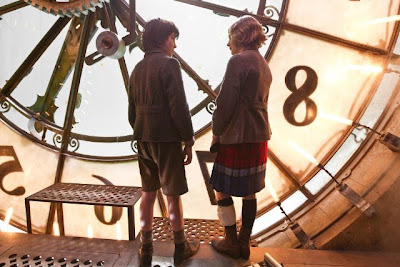
You'll get no argument from me. Michel Hazanavicius’s novelty film, "The Artist," is an artful charmer but it's little more than that, taking its inspiration from such Tinseltown chestnuts as "A Star Is Born" and "Singin' in the Rain" as it tracks the downward spiral of fictional silent film fave George Valentin following his willful refusal to make talkies.
And that's it.
It's difficult to get fully invested in George's plight because, unlike Jean Hagan's Lina Lamont in "Singin' in the Rain," the problem apparently isn't a horrible speaking voice. He just doesn't want to be
seen talking on film.
Why? Well, because he doesn't believe in it.
Anyway, getting engaged in the life of someone who willfully sabotages his own career is hardly worth the time. Frankly, it makes no sense.
The one element that does engage us - or me, at least - is star Jean Dujardin as George. Dujardin is a terrifically magnetic actor, but it's his wide smile that's irresistible and that attracts us - a smile made for CinemaScope. The fact is, when Dujardin is on screen, you can't take your eyes off him. He's a real Movie Star. This is masterful casting. And playing Esther Blodgett to his Norman Maine, Bérénice Bejo is pitch-perfect as an ingénue who lives up to her name - Peppy Miller.
Now, on to other things...
The film's composer Ludovic Bource (or perhaps Hazanavicius himself) has appropriated a huge hunk of music from Alfred Hitchcock's "Vertigo" (1958) - namely, Bernard Hermann's extended Love Suite - for the middle section of the film. I'm referring to the 10-minute sequence (
spoiler alert!) in which (1) Dujardin spots himself in the reflection of a store window, (2) finds all his belongings that Bejo clandestinely purchased at the auction and then (3) goes home to commit suicide, a sequence that crosscuts to a frantic Bejo driving through L.A. hoping to rescue him.
Hermann's music receives the usual perfunctory, miniscule mention in the end credits, which doesn't seem nearly enough. And exacerbating the situation, the title "Vertigo" isn't invoked at all for some curious reason.
I believe that it can be safely assumed that Bource will be a major contender for a scoring Oscar - and will be the presumed winner, given that the film is literally
wall-to-wall music. His score is very good, but the fact is, the most impressive piece of music in "The Artist" was written by...
Bernard Hermann.
It's likely that most viewers (and perhaps even some uninformed Academy voters) will not be aware of this; I don't think any critic has mentioned it so far. I wonder if, should he win the Oscar, Bource will mention Hermann's contribution to the film. I'm a little disappointed that the Hitchcock and Hermann estates would allow such an appropriation without more prominent screen credit: Hermann should be mentioned in the opening credits - below, or parathentical to, Bource's credit.
Any opinions on this? Share!
Addendum: After writing this, I learned that several others concur with me regarding the use of the Hermann music in the film, including one of the stars of "Vertigo," Kim Novak. Here's what
Anne Thompson has to say on the matter of Novak's protest.
 I never quite "got" the Fox Movie Channel.
I never quite "got" the Fox Movie Channel.




































